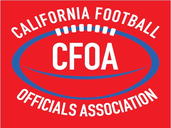Developing an officiating philosophy is an important skill for success. Retired Big Ten referee Tom Quinn always referred to this as the three-legged stool. One leg being rules knowledge, another leg is mechanics, and the third leg is philosophy. If one leg is weak, the stool will topple. When all three legs of the officiating stool are strong, we have a game the players can play, the coaches can coach, and the fans. Officials cannot pick and choose the rules to enforce, but an official who combines both technical and practical skills can support the rules and still not call every play exactly by the book.
Philosophy is not something that comes easy. It takes seasons to develop and it’s something that is ever hanging. The best officials approach the game with an attitude that says we never stop learning. Why those that feel that they ’know-it-all’ will quickly be humbled in the world of officiating. With 22 players and nearly 150 plays per game to officiate, there will be hundreds of rulings and judgements to be made during the course of a game. Football can be a complex game that is not as black and white as the rules make it. Being able to handle the grey areas of judgment and enforcement is critical in applying the spirit and intent, which the rule was written.
Officiating philosophy is described as who we are and how we handle game situations. Remember, we have the responsibility to be the guardians of the game. This is an awesome, yet important responsibility that we need to take seriously. The game belongs to the kids playing it. Remember no matter what the age of the players, it’s their game, not ours.
As we go through our careers we see different types and style of officials. Some officials know the rulebook like the back of their hand. They can quote rule, section, article and paragraph when it comes to any rule imaginable but have a hard time calling pass interference, holding and other situations. Other officials are not great with the rules but seem to have a feel for the game, maybe because they played. They seem to understand the ‘accepted’ calls hat really impact the game. These officials generally are successful but aren’t able to help the crew is situations where rule knowledge is critical. The third official is the one who balances the rulebook with common sense or ‘game awareness’. At the professional and collegiate levels, officiating supervisors spend more time with their staff on how to call the game than with specific rules. At the lower levels of officiating, the lack of immediate supervision and feedback limits officials in developing these skills. The lower levels are also where officials develop their own philosophies through trial and error on mentors to hone their game skills. This is why officials must be lifetime learners.
Football officiating requires the crew to be more consistent in their calls more than any other sport. Whether it is a three or seven-person crew, everyone must be on the same page and have compatible philosophies if there is going to be consistency throughout the game. Adapting to the level of play is another critical factor in officiating success. What is a foul at one level may not be a foul at another level. The ability to adapt to the play and judiciously apply the rules demands good officiating philosophy. Noting will drive the players and coaches up a wall faster than having holding or pass interference called differently among crew members. Sideline officials must enforce the same standards for coaches on their sideline as their partner across the field. Successful officiating is not a science, it’s an art. Individual and crew success comes from everyone being well grounded in officiating philosophies.

